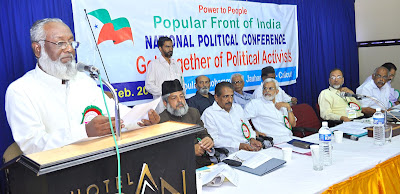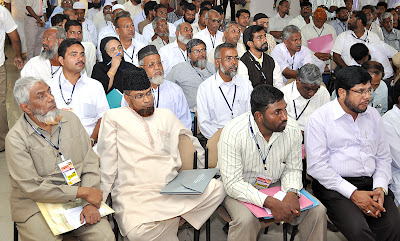By Pervez Bari, TwoCircles.net,
Kozhikode: The Popular Front of India (PFI) is a social movement and not a political forum but has political vision and mission. For the empowerment of Muslims, Dalits and Other Backward communities political empowerment is necessary which has been enshrined in the Constitution of India. However, the present political set up in the country is not up to the mark to ensure Muslim Ummah and other have-nots adequate representation in the centres of power for their overall development and to enjoy the fruits of real democracy.
The above observations were made by PFI chairman E. M. Abdul Rahiman in his concluding remarks in the “Get-together of Political Activists” session on the second day of the ongoing National Political Conference of PFI here on Saturday at Kozhikode in the southern India state of Kerala.

Abdul Rahiman said PFI will not dabble with electoral politics in the ensuing Lok Sabha elections in April-May 2009 and neither in 2014 but may think about 2019 general elections. However, in the intervening period it will concentrate in making Muslims and others aware of their constitutional rights and build cadres to achieve their goal of indulging in positive and not negative politics which has been the strategy of Muslims up till now.
Political activists from various Indian states participated in the deliberations during the interactive session. The points of discussion were (a) What are the various options before the Muslims in India for politically empowering themselves?; How can they ensure the due representation and share in government?; (b) Can we continue to depend on different political parties and continue supporting them?; (c) How do we assess the role of existing parties in some parts of India and their future?; (d) Is there a need for a national political party for Muslims and by Muslims?; (e) do we find any scope for cooperation, coordination or merger of existing political parties?; (f) What should be the structural frame work of a national Muslim movement or a party?; (g) What are the priority issues to be addressed by the Muslim political movement or party on the national level? and (h) What priority activities can be suggested for Muslim politics during the next five years and 10 years, with an eye on general elections 2014 and 2019?

PFI former chairman and member of National Executive Council E. Abubacker in his presidential address said there is an India in our dream which is without discrimination and where social justice and economic equality prevail. An India where prevails economic justice and social structure free from exploitation; a system which is ethical and providing legal security for values; A system of all people. It will be the eternal liberation to all Indians. Insha Allah
Abubacker said for fulfilling this, there should be systematic activity from national level to booth level, an activity apart from gathering people through emotional slogans, not a temporary activity of extravagance. On the other hand, it is an activity of creating cadres form booth level and equipping an incessant and ever existing working group. Instead of being onlookers for any kind of political chance game, be arise a working group prepared for political struggle, he added.
He said that Muslims have only one way in front of them. Not to be depressed by the past politics, imbibe lessons from it and step forward by trusting in our own strength and entrusting on Allah. It should not be our aim that who should not come to power? But our aim is that we must come to power. This is what we imply by positive politics, he explained.
“Dalits and Yadavs came to the fore front only because they adopted this policy. If they want BJP and other communal forces not to come to power, let them vote for us. We can ensure success if we can evolve a positive thinking among Indian Muslims”, Abubacker remarked.
When Muslims are talking about their representation in power, they are not requiring any communal demand. When asking for education and economic uplift, it should not be regarded communal. We are not asking for any communal need. We are raising our voice for our secular rights, he emphasized.
Abubacker emphatically said: “We have to underscore here a fact. Where you have power there you have existence. If you are not in power you are slaves. Therefore, our immediate effort must be for achieving share – adequate share in power. If the so-called development or improvement is to be accomplished all people of our country must be uplifted. They must be empowered in educational and politico-economical fields. Adivasis, Dalits, Muslims, farmers and villages must be free from discriminations. All people should be rulers”.
He observed that Muslims happened to be confined into a single face agenda that the BJP must be kept away from the administration. In a sense, it was unavoidable in that period, but till today Muslims could not retreat from that political stance. Secular parties including Congress competed for Muslim votes. As for Muslims they divided their votes among these secular parties. It made adverse effect in two ways: (i) Disunity in secular parties reinstated BJP into the administration. (ii) The vote bank power of Muslims faded away.
The secular parties worked overtly and covertly to squash Muslim vote bank and prevent their political empowerment. For example, PDF, a confederation of several Muslim organizations founded under the leadership of Moulana Kalb-e- Jawad was disintegrated. Secular parties were giving the message that we don’t want the organized Muslim power, we want their fragmented support.
“These facts prove that the negative politics we were playing in the political field from 1947 didn’t help us to achieve any advantage. At the same time, the threat that BJP would come into power was flared up so much that we couldn’t think of a positive politics”, he opined.
Abubacker said that let anybody come or not come, it is high time to meddle politically in order to obtain adequate representation for Muslim community in the administration. What did Muslims achieve by the political experiments of the past? What did the parties, whom we enthroned, provided us? he asked
The Muslim representation in assemblies and parliament was not proportionate to the population. Scheduled caste and scheduled tribe have reserved constituencies, but Muslims. Not only that, most often Muslim majority constituencies will have reserved for scheduled castes. Sachchar Committee has revealed these facts.
In olden days Muslim League had MLAs in West Bengal. In Maharashtra and Uttar Pradesh Muslim Majlis had been represented. But now these all have exhausted, none is representing Muslim parties today. In UP Dalits who constitute 22 per cent, are in power but Muslims who are 19 per cent are nowhere to be found, he pointed out.
In Kerala Muslim League is strong in Malabar area. MIM in Hyderabad is confined in four or five parliament constituencies. Both parties are not willing to come out from their regional constituencies and consider Indian Muslims as their constituency.
Here we are unable to distinguish between governments. Indian Muslims are living in a situation in which they are incapable of understanding the differences between BJP and Congress, BSP and BJP, CPM and BJP, Abubacker maintained. ([email protected])

